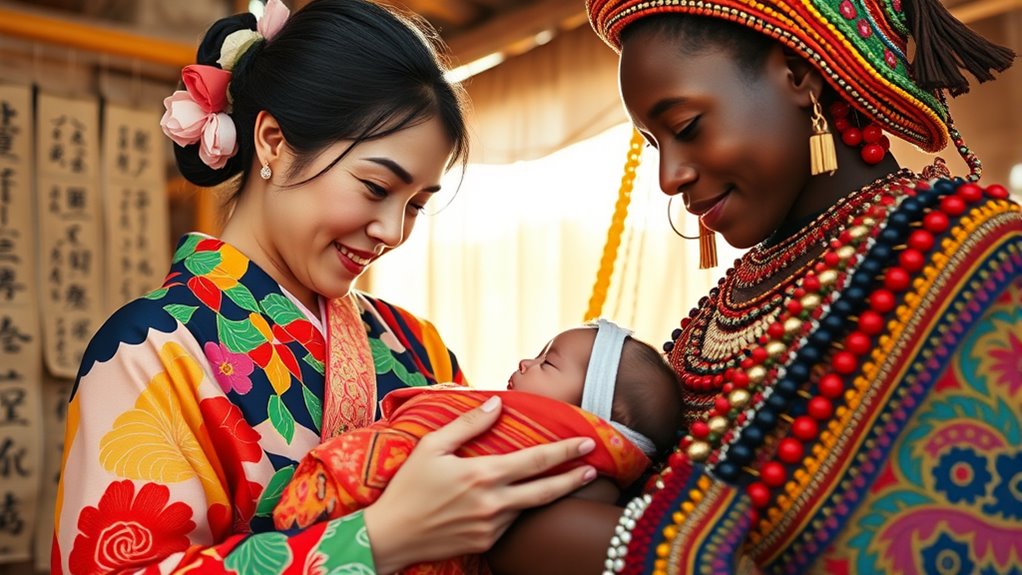Around the world, baby-naming traditions reflect deep cultural values and spiritual beliefs. You’ll find names that honor ancestors, nature, or community, often through ceremonies and rituals that strengthen bonds. In many cultures, names carry meanings, hopes, or virtues, while celebrations and gifts mark the special occasion. From African and Asian customs to European, Latin American, Oceanic, and indigenous practices, exploring these rich traditions reveals how names weave heritage, identity, and continuity. Discover more about these vibrant practices as you continue.
Key Takeaways
- Names embody cultural identity, family history, and community values across diverse societies worldwide.
- Naming ceremonies often involve elders, spiritual leaders, and rituals that emphasize tradition and cultural symbolism.
- In Oceanic, Indigenous, Middle Eastern, European, Latin American, and African cultures, names reflect lineage, virtues, and spiritual significance.
- Celebratory events, blessings, and symbolic gifts mark the importance of naming in various cultures.
- Modern trends include blending cultural elements and using digital tools to create unique, personalized names globally.
African Naming Customs and Significance
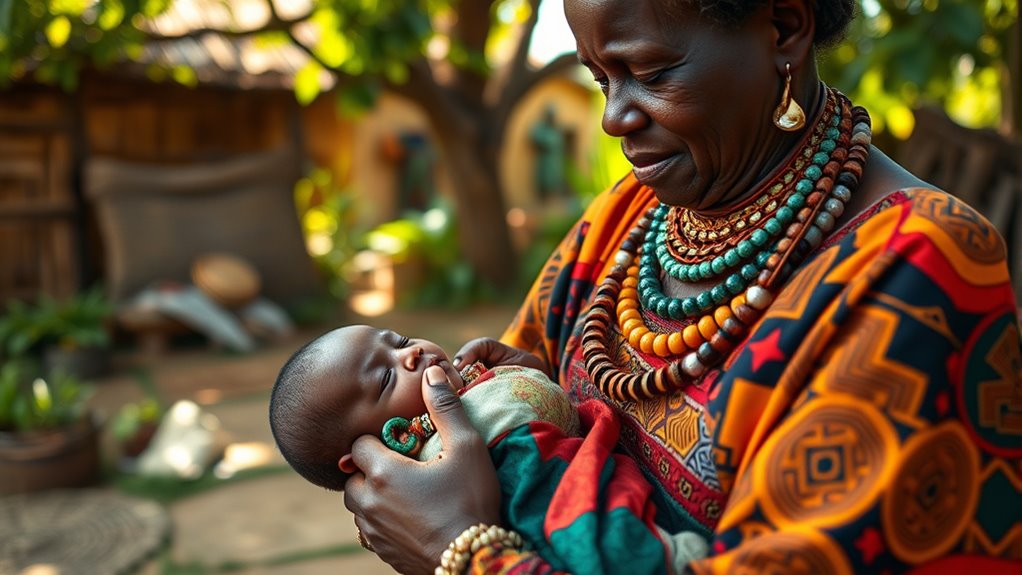
In many African cultures, naming a child is more than just giving a label; it’s a meaningful tradition that reflects the child’s identity, family history, and community values. Names often carry deep significance, capturing hopes, virtues, or circumstances surrounding the child’s birth. For example, you might hear names that honor ancestors or express gratitude for a safe delivery. The process can involve elaborate ceremonies, where community members gather to celebrate and bestow the name with blessings. These names often serve as a lifelong reminder of the child’s roots and cultural heritage. You’ll find that names in African societies are more than identifiers—they’re stories, prayers, and symbols woven into the fabric of community life.
Asian Naming Rituals and Beliefs

Asian naming rituals and beliefs are deeply rooted in cultural traditions that emphasize harmony, spirituality, and auspiciousness. Names are carefully chosen to bring good fortune, health, and success. In many Asian cultures, parents consult elders, spiritual guides, or astrologers to select a name that aligns with the baby’s zodiac, birth date, or family heritage. The meanings behind names often reflect virtues, strength, or positive qualities. Additionally, some cultures observe specific naming ceremonies or rituals that mark the baby’s official introduction into the community. These practices reinforce social bonds and cultural identity. Understanding cultural intelligence can help decode the significance of these practices across different societies. Here’s a quick overview of common Asian naming elements:
| Practice | Focus | Significance |
|---|---|---|
| Astrology | Birth date & zodiac signs | Ensures good fortune |
| Family elders | Respect & tradition | Upholds cultural values |
| Name meanings | Virtues & positive traits | Brings blessings |
| Rituals | Ceremonial naming | Marks a sacred transition |
| Spiritual guides | Auspicious timing | Enhances luck & harmony |
European Traditions in Naming and Heritage
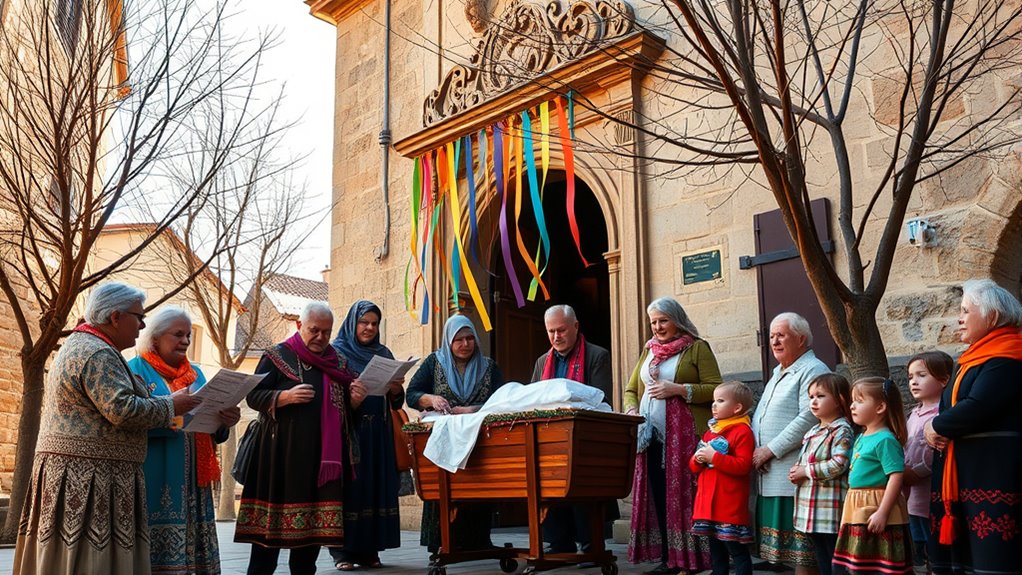
European naming traditions often reflect a rich history of cultural, religious, and familial influences that shape identity and social standing. You might notice how many countries follow naming patterns rooted in saints, historical figures, or family heritage. In some regions, children receive middle names honoring relatives or saints, reinforcing connections across generations. Surnames often indicate geographic origin, occupation, or social class, providing insight into your ancestry. In many cultures, naming ceremonies are important events, sometimes involving religious rituals or community gatherings. You may also see traditions like naming children after grandparents or choosing names based on the season or significant dates. These practices help preserve cultural identity, honor ancestors, and establish your place within community and history. Recognizing these naming customs can deepen your understanding of cultural heritage and social values.
Indigenous and Tribal Naming Practices
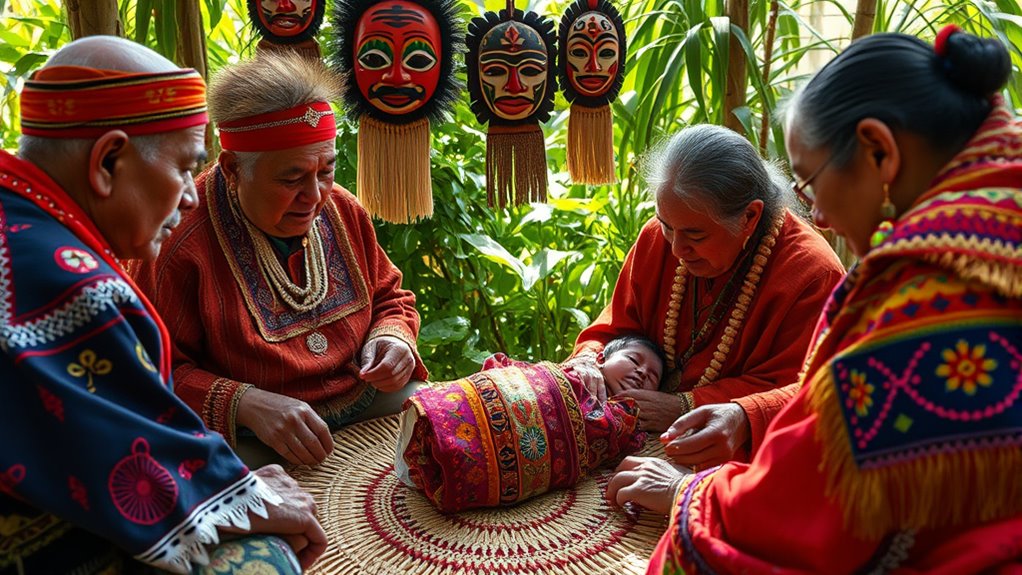
Indigenous and tribal naming practices often carry deep spiritual and cultural significance, serving as a way to connect individuals with their ancestors, environment, and community. You might notice that names are chosen through specific ceremonies or rituals, reflecting important life events or characteristics. For example:
- Names are often given based on personal traits, natural elements, or ancestral stories.
- Some cultures assign multiple names—each representing different stages or aspects of life.
- The naming process may involve elders or spiritual leaders, emphasizing communal participation and tradition.
- These practices are rooted in Indigenous Wellness Essentials, which emphasize community and cultural connections as integral to health and identity.
These practices reinforce identity, heritage, and spiritual beliefs, grounding individuals within their cultural context. By honoring nature, ancestors, and community, indigenous and tribal names serve as powerful symbols of belonging and continuity.
Middle Eastern Naming Heritage and Ceremonies
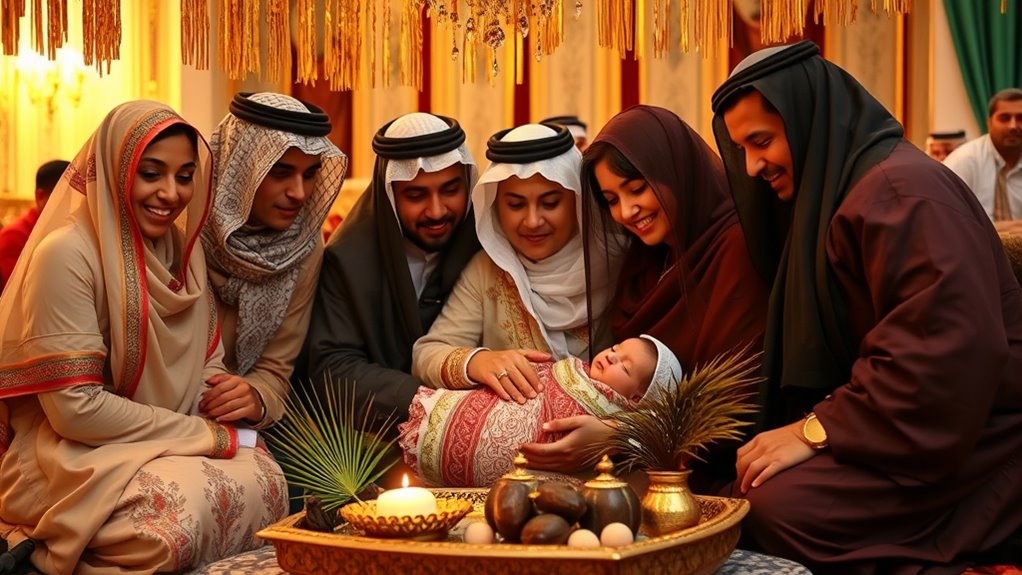
Have you ever wondered how Middle Eastern cultures preserve their rich history and values through naming? In these traditions, names carry deep spiritual and familial significance. Parents often select names based on religious figures, historical leaders, or virtues like wisdom and patience. The naming ceremony, called a “Aqiqah” in some communities, marks the baby’s arrival with prayers, recitations from the Quran, and special celebrations. It’s common to announce the baby’s name publicly, symbolizing the community’s support and blessing. In many cases, the child’s full name includes multiple components, such as a personal name, a patronymic, and sometimes a reference to the family’s lineage. These customs strengthen family bonds and keep cultural heritage alive through generations. Additionally, naming traditions often incorporate elements that reflect the child’s anticipated character and role within the community.
Latin American Naming Celebrations and Customs
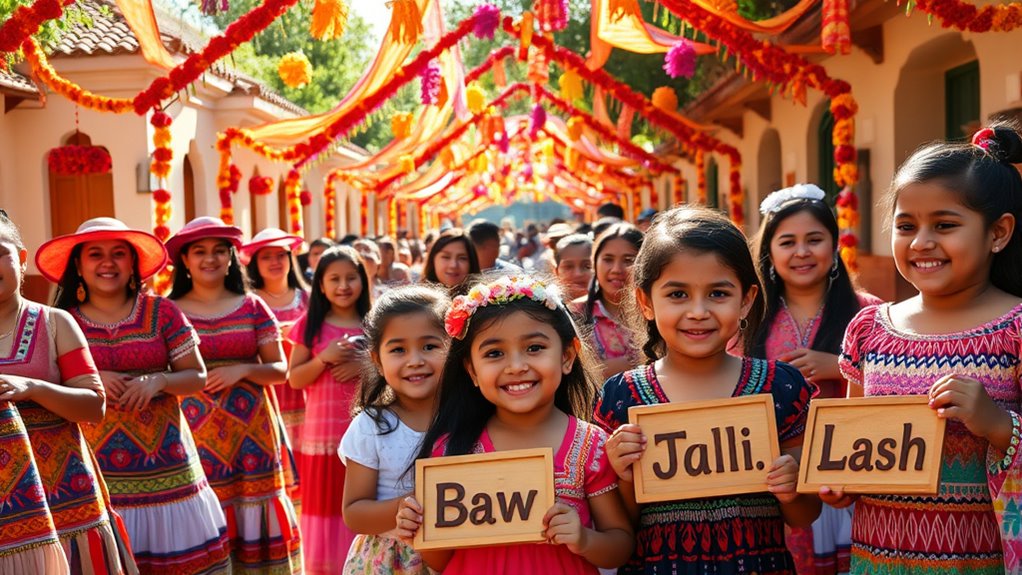
Latin American naming celebrations hold deep cultural significance, marking the child’s official arrival into the community. Traditional names are often chosen to honor family heritage or religious figures, reflecting local customs. During festivities, families celebrate with lively gatherings, giving meaningful gifts to welcome the new baby.
Naming Ceremonies Significance
Naming ceremonies in Latin America hold deep cultural significance, marking a child’s formal introduction to their community and spiritual identity. These events are more than just giving a name; they celebrate heritage and family bonds. During the ceremony, you’ll notice key traditions that emphasize the child’s importance. For example:
- Cultural rituals that invoke blessings and protection from spirits or ancestors.
- Family members and community leaders offering prayers or speeches to welcome the child.
- The presentation of symbolic objects or tokens representing hope and future success.
- The use of ceramic or recycled materials in ceremonial decorations to reflect environmental values and cultural identity.
These customs reinforce the child’s place within their cultural and spiritual community. They serve as a meaningful rite of passage, ensuring the child’s name is rooted in tradition and shared values that will guide them throughout life.
Traditional Name Choices
During Latin American naming celebrations, choosing a child’s name often reflects a blend of cultural heritage, family history, and spiritual beliefs. You might select a name honoring a beloved ancestor or a saint, emphasizing the importance of tradition. Many parents combine names from their own family lineages with popular saints’ names to create meaningful combinations. It’s common to give children names that carry positive qualities, such as strength or wisdom, based on historical or religious significance. Sometimes, names are chosen to honor a particular event or season, linking the child’s identity to cultural stories or histories. Overall, the process highlights a deep respect for heritage and spirituality, ensuring the child’s name embodies values, faith, and familial ties that are cherished across generations. Additionally, understanding the personality traits associated with certain names can provide insight into a child’s potential development and social interactions.
Celebratory Festivities and Gifts
Have you ever wondered how families celebrate the arrival of a new baby through special festivities and meaningful gifts? In Latin American cultures, these moments are vibrant and full of symbolism. Typically, families organize a joyful gathering to honor the baby’s arrival. During these celebrations, you might observe:
- Giving symbolic gifts like gold jewelry or embroidered keepsakes to welcome the child.
- Hosting a ceremony such as a baptismo or christening, often with lively church festivities.
- Sharing traditional foods and sweets that symbolize prosperity and good fortune.
- Incorporating cultural traditions that highlight the community’s unique customs and heritage.
These customs emphasize community, faith, and family bonds. Gifts and festivities serve as expressions of love and blessings, making the baby’s debut a memorable event for everyone involved.
Oceanic and Pacific Island Naming Customs
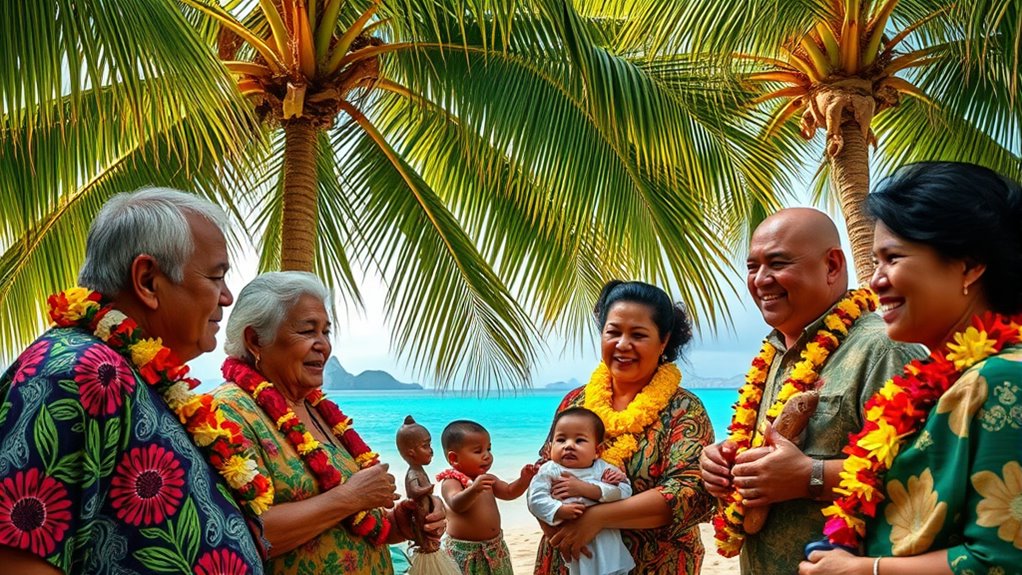
In Oceanic and Pacific Island cultures, naming customs often reflect deep connections to family, nature, and spiritual beliefs. When a baby is born, families may hold ceremonies to choose a name that signifies the child’s lineage, traits, or spiritual significance. Sometimes, names are inherited from ancestors to honor lineage and maintain tradition. Nature plays a crucial role; children might be named after natural elements like stars, ocean creatures, or plants, symbolizing their link to the environment. In many communities, names are given during special rituals performed by elders or spiritual leaders, emphasizing the importance of community and spiritual guidance. These customs reinforce cultural identity, family ties, and a child’s place within the natural and spiritual worlds. Additionally, naming ceremonies often involve intricate rituals and symbolism that vary between different island groups, highlighting the rich diversity of traditions across the region.
Modern Trends and Innovations in Global Baby Naming
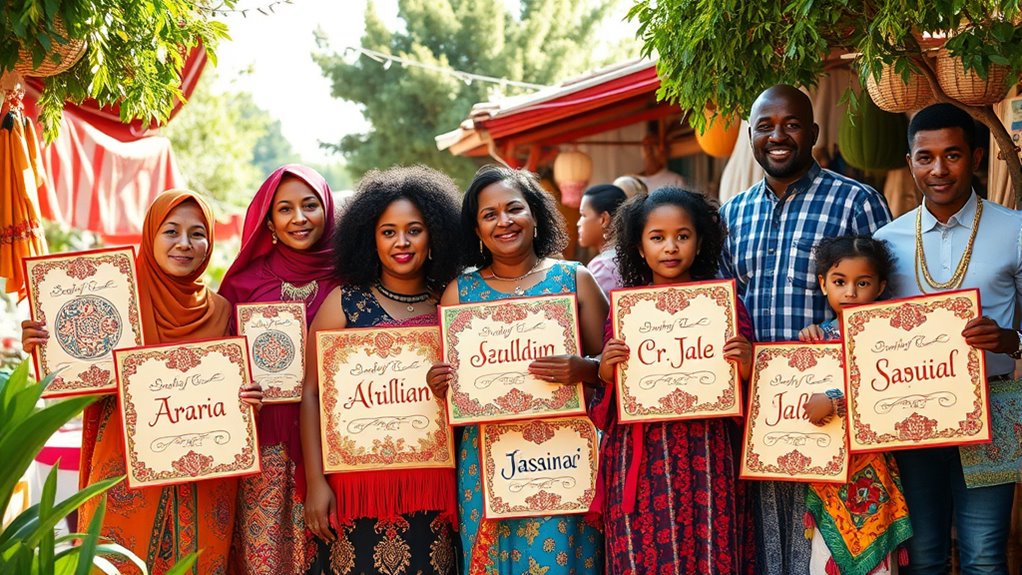
You’ll notice that digital platforms are heavily shaping modern baby names, making them more unique and personalized. Cultural influences blend more seamlessly as parents combine elements from different traditions to create new names. These innovations reflect a dynamic, interconnected world where naming practices continue to evolve rapidly. Additionally, some parents are increasingly considering legal and cultural implications when choosing names to ensure they accommodate different familial and societal expectations.
Digital Influence on Names
Digital platforms have revolutionized how parents choose baby names, making it easier to access a vast array of cultural influences and trending options. You can explore global naming trends, discover unique names, and even see real-time popularity charts with just a few clicks. These platforms also allow you to:
- Browse curated lists based on themes, origins, or modern trends.
- Track name popularity over time across different regions.
- Connect with online communities to share ideas and seek advice.
This digital influence means your options aren’t limited by geography or tradition alone. Instead, you can blend cultural elements or follow the latest trends, giving you a broader, more personalized approach to naming your child. It’s a dynamic, accessible way to find the perfect name in today’s interconnected world. Additionally, AI-powered predictive analytics can help anticipate future naming trends, making your choice even more informed.
Fusion of Cultural Elements
As modern parents seek unique and meaningful names, blending cultural elements from different regions has become a popular trend, reflecting a desire to honor diverse heritages while embracing innovation. You might choose a name that combines sounds or meanings from multiple cultures, creating a personalized identity that celebrates global roots. This fusion often results in names that are both familiar and novel, appealing to families who want to preserve tradition while embracing modernity. For example, combining a Western name with an Asian or African element can produce a distinctive and meaningful choice. These hybrid names showcase creativity and respect for cultural diversity, allowing you to express your family’s unique story. As a result, such names foster a sense of global connectedness and cultural appreciation.
Frequently Asked Questions
How Do Naming Customs Influence a Person’s Social Status?
Naming customs can substantially impact your social status. When you follow traditional or culturally significant naming practices, you might gain respect and acceptance within your community. Conversely, unique or unconventional names could set you apart or sometimes lead to misunderstanding. Your name often reflects your cultural background and social connections, influencing how others perceive you. So, your naming choices can shape your social identity and opportunities throughout life.
Are There Any Taboos Associated With Certain Baby Names Globally?
You might wonder if certain baby names carry taboos worldwide, and the answer is yes. In some cultures, naming a child after a controversial figure or using words with negative meanings can bring bad luck or social stigma. For example, some names are avoided because they’re associated with tragic events or disrespectful terms. Always research local customs to guarantee your chosen name respects cultural sensitivities and avoids unintended taboos.
How Do Parents Choose Names That Reflect Cultural Identity?
You’re on the right track when considering how parents pick names that mirror their cultural roots. They often look to family history, traditional names, or meaningful words from their language. Sometimes, they blend modern trends with cultural significance, ensuring their child’s name carries a piece of home wherever they go. It’s a balancing act—keeping tradition alive while embracing new influences, all to honor their identity and heritage.
What Role Do Names Play in Inheritance and Family Lineage?
Names play a essential role in inheritance and family lineage, serving as symbols of heritage and continuity. When you choose a name, you’re often honoring ancestors or passing down family traditions, which helps preserve your cultural identity. Names can connect generations, remind you of your roots, and carry family stories. By selecting meaningful names, you actively maintain your family’s legacy and guarantee that your history endures through the generations.
How Have Globalization and Technology Impacted Traditional Naming Practices?
Globalization and technology transform naming traditions, tearing down borders and blending beliefs. You now see more multicultural names, reflecting diverse backgrounds, and parents easily access global naming trends online. This digital domain democratizes decisions, encouraging experimentation and expansion beyond traditional practices. As a result, you witness a world where names are more fluid, forging new identities while still honoring roots, shaping a shared, yet personalized, cultural tapestry.
Conclusion
Just like a global tapestry woven with vibrant threads, each culture’s naming traditions add unique colors to our shared story. Imagine holding a newborn and discovering their name carries ancient blessings, tribal stories, or modern hopes—all reflecting their heritage. These customs remind you that a name isn’t just a label but a powerful symbol of identity, history, and love. Embrace this rich diversity, knowing each name connects us to a world of traditions waiting to be explored.
